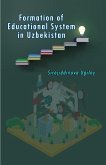Studying the categorization and social characteristics of Ahmed Zaki Walidi's concept of the philosophy of history can define the history of philosophy as an independent science with immanent goals. First of all, these specific empirical goals are important in describing, systematizing, and considering his socio-philosophical views. Ahmed Zaki Walidi's views on the philosophy of history as an approach to the study of existing ideas and knowledge about primary reality are called not only to describe, but also to explain the origin of ideas and ways of understanding them. These are the genetic-evolutionary and functional goals that are important for the philosophizing of religious ideas that lie outside the historical-philosophical process. The monograph is intended for teachers, scientific staff, researchers and students of higher and secondary special educational institutions, as well as general readers interested in this topic.
Hinweis: Dieser Artikel kann nur an eine deutsche Lieferadresse ausgeliefert werden.
Hinweis: Dieser Artikel kann nur an eine deutsche Lieferadresse ausgeliefert werden.








